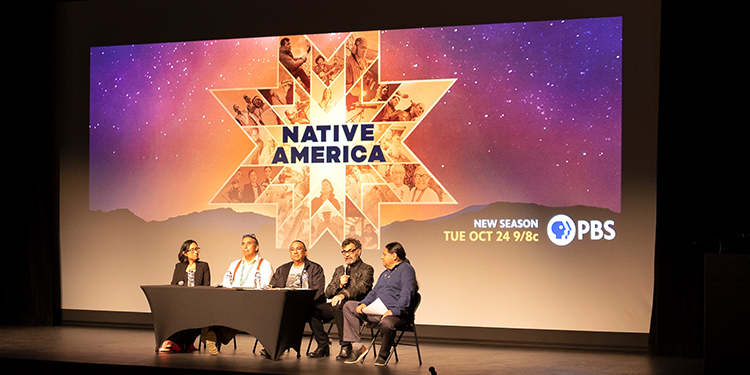Public Media Offers Authentic, Engaging Programming During Native American Heritage Month
November 1, 2023
‘Native America’ Producer Jennifer Johns (Diné), left, Navajo Museum Director Manuelito Wheeler (Navajo), Producer Dan Golding (Quechan), Executive Producer Gary Glassman, and ‘Native America Calling’ Host Shawn Spruce (Laguna) at the KiMo Theater in Albuquerque.
Public media is presenting on-air and on-demand programming about Native America and Native Americans with community engagement throughout November, Native American Heritage Month.
Season 2 of Native America, airing Tuesdays on PBS through November 14 and streaming on its digital channels, offers a groundbreaking portrait of contemporary Native America from a team that emphasized Native participation in all aspects of production. The series, produced by Providence Pictures with funding from the Corporation for Public Broadcasting, is showcased in screenings, discussions and other events across Indian Country, as well as a special screening of “Native America: Language is Life,” November 9 at The Library of Congress. The event features a panel discussion with representatives from the Passamaquoddy, as well as director Daniel Golding (Quechan) and executive producer Gary Glassman.
With funding from CPB, Koahnic Broadcast Corp. and Native Public Media have hosted screenings and discussions on “Native America,” including events at the Autry Museum in Los Angeles; the KiMo Theater in Albuquerque, co-hosted by New Mexico PBS; Fort Lewis College, in Durango, CO, co-hosted by public radio station KSUT; the Dena’ina Center in Anchorage, AK; the Salish Kootnay Community College, serving the Flathead Indian Reservation in Pablo, MT; with more events coming in Eureka, CA; Duluth, MN, Cherokee, NC; and New York City. Many of the events have been moderated by Sean Spruce (Laguna Pueblo), host of Native America Calling, the live call-in program produced by Koahnic Broadcast Corporation and heard on nearly 90 public, community and tribal public radio stations in the U.S. and Canada.
The American Buffalo, the four-hour series from Ken Burns tracing the history of the bison and anchored by the stories of Indigenous people, premiered on PBS in October and is streaming on PBS.org and the PBS app through November. Nebraska Public Media, Vision Maker Media and The Durham Museum are hosting Restoring Indigenous Food Sovereignty, a discussion on the restoration and revitalization of Indigenous foodways, lifeways and cultural knowledge inspired by “The American Buffalo.” The event, November 7 in Omaha, Nebraska, features excerpts from the recent films Homecoming by Julianna Brannum (Commanche), a companion film to “The American Buffalo,” and Seed Warriors, a Nebraska Stories episode from Nebraska Public Media highlighting the Pawnee Seed Preservation Society.
“Native America” and “The American Buffalo” are centerpieces of PBS’ slate of Indigenous programming honoring Native American Heritage Month. PBS offerings also include the six-part dramatic series Little Bird, about a woman who discovered she had been forcibly taken from her family as part of the Canadian government’s Sixties Scoop; and digital series “A People’s History of Native America,” premiering with The Truth Behind the Legend of Pocahontas on the PBS Origins YouTube channel; and Sovereign Innovations, launching November 15 with “Indigenous Fashion Innovators” on PBS Voices YouTube channel.
WORLD, a multiplatform hub for diverse documentary programs, also offers a slate of Native American Heritage Month programming online and on WORLD Channel, a multicast channel available in three-fourths of the country. Premieres include:
- Town Destroyer, premiering on America ReFramed (November 2 on TV, online & on the PBS app), explores the art, history, struggle, and politics around the Victor Arnautoff murals at a San Francisco public high school. The Depression-era murals depict the life of the school’s namesake George Washington: slaveowner, military leader, land speculator, president, and a man Native leaders called “Town Destroyer” after he ordered their villages destroyed during the Revolutionary War.
- Sisters Rising (America ReFramed, November 9 on TV, online & on the PBS app) follows six Native American survivors of sexual assault who fight to restore personal and tribal sovereignty as the necessary step toward ending violence against Native women.
- Stories From the Stage, WORLD’s series featuring ordinary people telling extraordinary stories from their lives, features two episodes highlighting Indigenous stories. Sacred Circle, produced in collaboration with Vision Maker Media and Nebraska Public Media, premieres November 13; All Connected, produced in collaboration with Arizona PBS, premieres November 20, both on TV, online and on the PBS app.
Other Programming (check local listings):
Indigenize the Plate, a documentary following a Diné woman who travels from the Navajo Nation to a Quechuan community in Peru that has developed a way to address food and cultural sustainability, and Something Inside is Broken, a Native American musical based on the true story of a Native slave revolt at Sutter’s Fort in California in 1846, are airing on local public television stations starting in November. Both were produced by Vision Maker Media, the CPB-supported organization that works with Native producers to develop, produce, and distribute public media programming.
A Prayer for Salmon, an 11-part audio documentary series from KALW’s The Spiritual Edge, tells the story of the Winnemem Wintu people and their clash with the Northern California’s Shasta Dam. The series is being distributed to public radio stations and is available on demand from Native Voice One, the distribution arm of Koahnic Broadcast Corporation.
DeCoded, a half-hour radio special telling the stories of World War II Native code talkers Lex Porter (Nagaajiwanaang) and Reuben St. Clair (Mdewakanton), is being offered to public radio stations in November through Native Voice One (check local listings). It’s produced by Minnesota Native News & Ampers, Diverse Radio for Minnesota’s Communities with support from the Minnesota Arts and Cultural Heritage fund.
As part of its podcast Brave Little State, Vermont Public published a three-part series Recognized, examining contested claims of the legitimacy of Vermont’s four state-recognized tribes: the Abenaki Nation of Missisquoi; the Elnu Abenaki Tribe; the Koasek Traditional Band of the Koas Abenaki Nation; and the Nulhegan Band of the Coosuck Abenaki Nation.
To subscribe to CPB spotlights, press releases and grant announcements, go to cpb.org/subscribe





